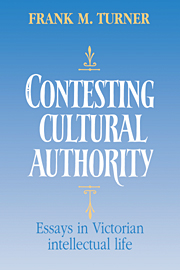Book contents
- Frontmatter
- Contents
- Preface
- I SHIFTING BOUNDARIES
- II SCIENCE AND THE WIDER CULTURE
- III MODERNS AND ANCIENTS
- 9 British politics and the demise of the Roman republic: 1700–1939
- 10 Ancient materialism and modern science: Lucretius among the Victorians
- 11 Virgil in Victorian classical contexts
- 12 The triumph of idealism in Victorian classical studies
- Index
10 - Ancient materialism and modern science: Lucretius among the Victorians
Published online by Cambridge University Press: 22 September 2009
- Frontmatter
- Contents
- Preface
- I SHIFTING BOUNDARIES
- II SCIENCE AND THE WIDER CULTURE
- III MODERNS AND ANCIENTS
- 9 British politics and the demise of the Roman republic: 1700–1939
- 10 Ancient materialism and modern science: Lucretius among the Victorians
- 11 Virgil in Victorian classical contexts
- 12 The triumph of idealism in Victorian classical studies
- Index
Summary
The ninth edition of the Encyclopaedia Britannica is one of the most significant yet least explored documents of Victorian intellectual history. Like other old encyclopaedias with discarded theories, dated articles, and incomplete bibliographies, it has been relegated to the darker and mustier aisles of library stacks where scholars too rarely wander. The ninth edition, published between 1875 and 1889, deserves a better fate. Under the leadership of T. Spencer Baynes, its editors determined to present ‘the influence of the modern spirit’ in literature, history, philosophy, religion, and the sciences. For the first time articles on biblical criticism, comparative religion, psychology, and evolution found their way into Britannica's finely printed columns. Contributors such as T. H. Huxley, James Clerk Maxwell, W. Robertson Smith, and James Ward guaranteed not only distinguished but also often pioneering essays many of which constituted short monographs on their subjects.
Besides illuminating the general state of late Victorian scholarship, the twenty-five volumes of the encyclopaedia provide the historian with a useful point of departure for examining the impact of advanced ideas and theories on more traditional areas of intellectual life. A striking example of a standard entry that unexpectedly reflected the larger controversies of the day was W. Y. Sellar's essay on the Roman poet Lucretius. Sellar opened the six-page article by emphasizing the new interest and relevance that had of late been accorded this ancient author.
- Type
- Chapter
- Information
- Contesting Cultural AuthorityEssays in Victorian Intellectual Life, pp. 262 - 283Publisher: Cambridge University PressPrint publication year: 1993
- 1
- Cited by

